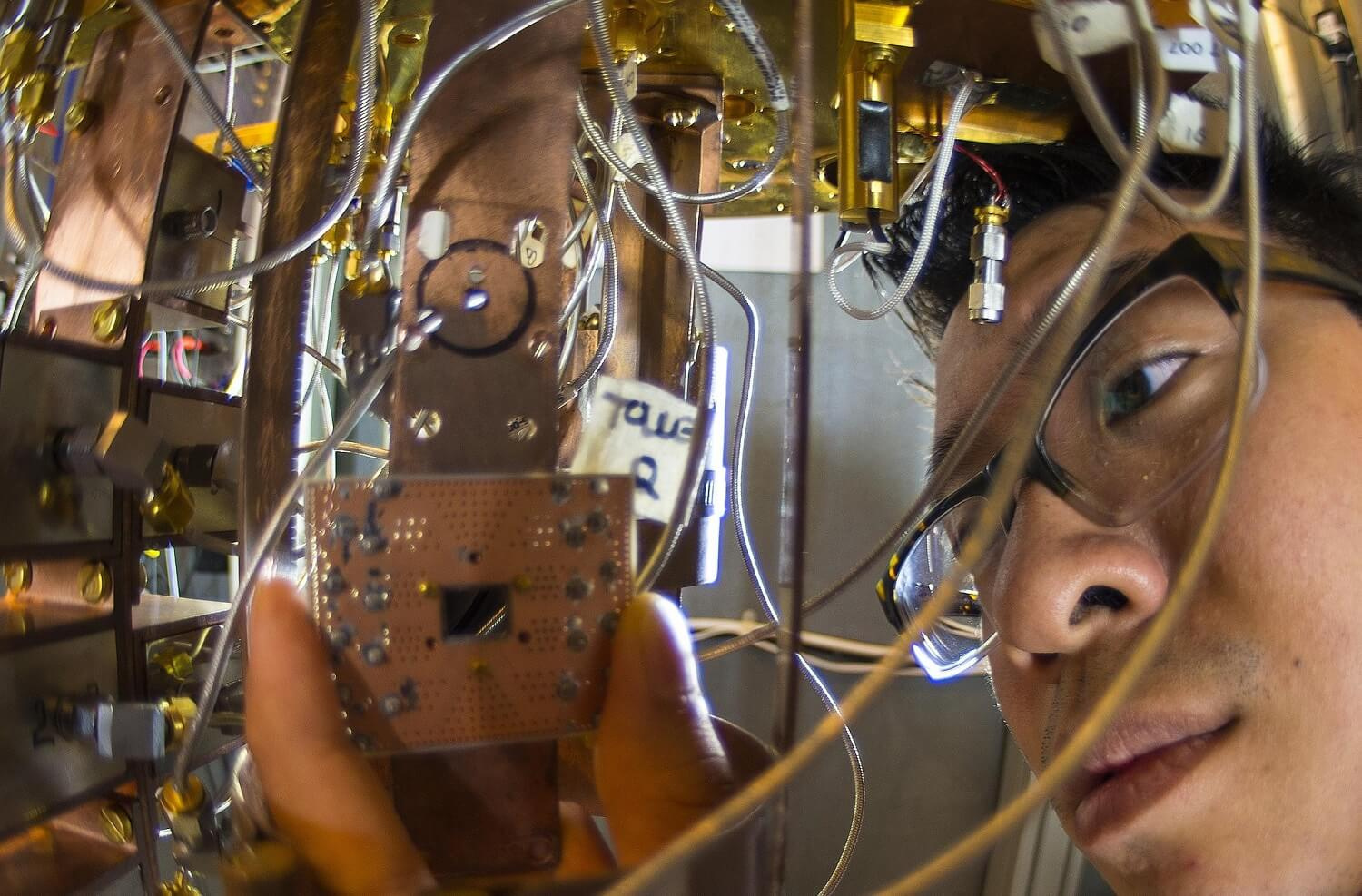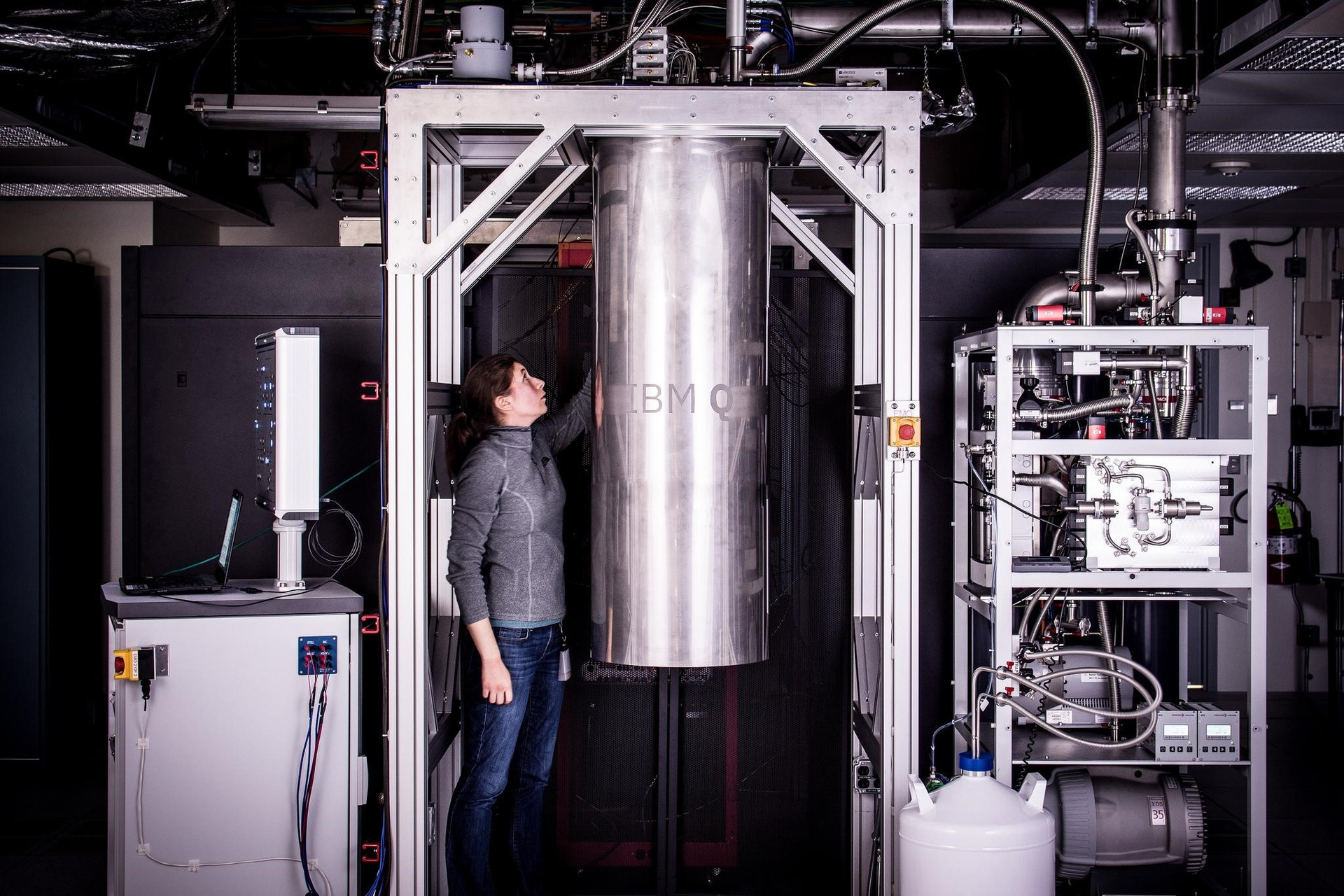“To each according to a quantum”: Will quantum computing become a commercial product?
Deciphering DNA, conducting complex chemical experiments with bacteria and solving cryptographic problems - is all this possible outside the walls of specialized laboratories? Today is unlikely. However, work on the release of a quantum computer for the mass market, to which such tasks are on the shoulder, is actively underway, as the latest news shows.

/ Flickr / IBM Research / CC
In June, a startup IonQ announced it was raising $ 22 million to produce general-purpose quantum processors for 12 months. In March, another company - Rigetti Computing - raised $ 64 million. In its plans to demonstrate next year a working prototype, surpassing the world's most powerful supercomputers.
')
At the same time, IBM announced its initiative to create a commercial IBM Q platform for solving resource-intensive tasks, and two months later it doubled the computing power of the IBM Quantum Cloud quantum system. One of the updated processors is the foundation of IBM Q, and the other is available to developers, researchers and programmers for quantum computing through the IBM Cloud service.
Google is another big player in cloud computing. The project of the IT giant Alphabet has already opened early access to its service for researchers. Also, as reported by Bloomberg, the company is working on the ProjectQ initiative, an open source platform for creating software for the computing power of quantum computers.
Along with this, important events such as the creation of qubits by scientists from the Massachusetts Institute and Harvard, capable of storing information hundreds of times longer, occur every month in the world. Or the union of Microsoft and Sydney University to work on the first quantum computer.
“I would say that a working quantum computer is probably the most complex technology people have ever created,” says Chad Riggetti, founder and CEO of Rigetti Computing.
Andrew Bestwick (Andrew Bestwick), director of engineering at Rigetti, adds that a lot has already been achieved, and the main problem now is to take all the achievements on small systems and create the final product in a scalable form. To make technology not only applied to resource-intensive tasks, but also as accessible as a standard personal computer.

/ Flickr / IBM Research / CC
The efforts of large corporations suggest that with the advent of the first working instance, specialists will be able to access the quantum facilities for carrying out complex calculations. However, the mass consumer market is potentially interested in quantum computing.
According to Markets and Markets, the quantum computing market will grow over the next 6 years at an average annual rate of 29% and will reach $ 495.3 million by 2023. Key growth points will be the scope of cybercrime, the introduction of quantum computing technologies in the automotive and defense industries and an increase in government investments. structures.
For example, the company D-WAVE has already carried out the first sale of a commercial quantum computer this year. Cypor Security Defense Systems acquired a 2000 qubit device to combat cyber attacks. The system reportedly cost the company $ 15 million. Such transactions in the commercial sector are likely to become more common in the near future, but a real “quantum leap” should be expected with the development of cloud platforms from IBM, Google and other companies.
Quantum computing can be widely used in the IoT environment. New networks require different management approaches. We need capacity for analysis, and enterprises working with IoT are already aware that the opportunities provided by the existing equipment are not enough to fully service the networks. Therefore, hopes are pinned on quantum computers.
However, in order for quantum computing to be commercialized, several technological problems must be overcome. Quantum hardware needs to be scaled to compete with classic hardware.
Therefore, Yoshihisa Yamamoto, a professor of physics at Stanford University, and a number of his colleagues consider the talk about the commercialization of quantum technologies to be very premature. The merits of D-WAVE on the market are still being challenged by researchers, because the system implemented by the company has limited potential and is only suitable for optimization tasks.
But today, almost all participants in the quantum market recognize the immaturity of their technology. Scott Crowder, vice president and chief technical officer of quantum computing at IBM, believes that quantum computing will have no practical use over the next few years. David Meing (David Moehring), CEO of IonQ, states that they "are unlikely to solve very large molecular or optimization problems." Bestwick said that the first commercial systems of their company are likely to be hybrid.
Thus, the long-awaited quantum solutions can not yet stand on a par with the mass technologies in which the private sector has become accustomed to investing. But, as noted in Wired, “they started selling quantum computers before they appeared,” which means this is the case when the market with its leaders will be formed before the creation of a working prototype.
PS What else do we write about in our blog? Here are some materials on the subject of hardware:

/ Flickr / IBM Research / CC
Approximation of the era of quantum computing
In June, a startup IonQ announced it was raising $ 22 million to produce general-purpose quantum processors for 12 months. In March, another company - Rigetti Computing - raised $ 64 million. In its plans to demonstrate next year a working prototype, surpassing the world's most powerful supercomputers.
')
At the same time, IBM announced its initiative to create a commercial IBM Q platform for solving resource-intensive tasks, and two months later it doubled the computing power of the IBM Quantum Cloud quantum system. One of the updated processors is the foundation of IBM Q, and the other is available to developers, researchers and programmers for quantum computing through the IBM Cloud service.
Google is another big player in cloud computing. The project of the IT giant Alphabet has already opened early access to its service for researchers. Also, as reported by Bloomberg, the company is working on the ProjectQ initiative, an open source platform for creating software for the computing power of quantum computers.
Along with this, important events such as the creation of qubits by scientists from the Massachusetts Institute and Harvard, capable of storing information hundreds of times longer, occur every month in the world. Or the union of Microsoft and Sydney University to work on the first quantum computer.
“I would say that a working quantum computer is probably the most complex technology people have ever created,” says Chad Riggetti, founder and CEO of Rigetti Computing.
Andrew Bestwick (Andrew Bestwick), director of engineering at Rigetti, adds that a lot has already been achieved, and the main problem now is to take all the achievements on small systems and create the final product in a scalable form. To make technology not only applied to resource-intensive tasks, but also as accessible as a standard personal computer.

/ Flickr / IBM Research / CC
Will technology become mass?
The efforts of large corporations suggest that with the advent of the first working instance, specialists will be able to access the quantum facilities for carrying out complex calculations. However, the mass consumer market is potentially interested in quantum computing.
According to Markets and Markets, the quantum computing market will grow over the next 6 years at an average annual rate of 29% and will reach $ 495.3 million by 2023. Key growth points will be the scope of cybercrime, the introduction of quantum computing technologies in the automotive and defense industries and an increase in government investments. structures.
For example, the company D-WAVE has already carried out the first sale of a commercial quantum computer this year. Cypor Security Defense Systems acquired a 2000 qubit device to combat cyber attacks. The system reportedly cost the company $ 15 million. Such transactions in the commercial sector are likely to become more common in the near future, but a real “quantum leap” should be expected with the development of cloud platforms from IBM, Google and other companies.
Quantum computing can be widely used in the IoT environment. New networks require different management approaches. We need capacity for analysis, and enterprises working with IoT are already aware that the opportunities provided by the existing equipment are not enough to fully service the networks. Therefore, hopes are pinned on quantum computers.
However, in order for quantum computing to be commercialized, several technological problems must be overcome. Quantum hardware needs to be scaled to compete with classic hardware.
Therefore, Yoshihisa Yamamoto, a professor of physics at Stanford University, and a number of his colleagues consider the talk about the commercialization of quantum technologies to be very premature. The merits of D-WAVE on the market are still being challenged by researchers, because the system implemented by the company has limited potential and is only suitable for optimization tasks.
But today, almost all participants in the quantum market recognize the immaturity of their technology. Scott Crowder, vice president and chief technical officer of quantum computing at IBM, believes that quantum computing will have no practical use over the next few years. David Meing (David Moehring), CEO of IonQ, states that they "are unlikely to solve very large molecular or optimization problems." Bestwick said that the first commercial systems of their company are likely to be hybrid.
Thus, the long-awaited quantum solutions can not yet stand on a par with the mass technologies in which the private sector has become accustomed to investing. But, as noted in Wired, “they started selling quantum computers before they appeared,” which means this is the case when the market with its leaders will be formed before the creation of a working prototype.
PS What else do we write about in our blog? Here are some materials on the subject of hardware:
Source: https://habr.com/ru/post/335890/
All Articles